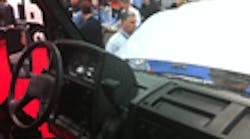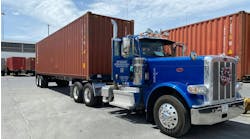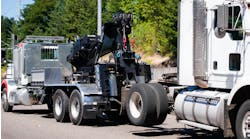INDIANAPOLIS. The air inside the Indiana Convention Center is palpable with optimism, driven by the positive views of U.S. vocational-truck market conditions expressed by OEMs as they roll out significant new truck and engine offerings this week here at the National Truck Equipment Assn. (NTEA) Work Truck Show.
The confidence that the work-truck market is bouncing back is powered by two forces— the economy’s continued recovery and the growing desire of fleets of all types to add greener vehicles. But also by a negative one—the sharp rise in diesel fuel costs as a result of the continuing political unrest in the Middle East, especially concerns about Libyan oil production.
While truck makers displaying and announcing vehicle rollouts at the show continue to tout their alternative fuel offerings, including new diesel-electric hybrid models, interestingly enough—in light of the ongoing quick march upwards of diesel fuel prices nationwide-- several manufacturers have announced additions of gasoline-fueled trucks as well this year.
However, each of these OEMs hastened to point out that gasoline remains a preferred fuel by many vocational truck buyers, especially those fleet operators highly concerned with the initial acquisition prices for new trucks. And these truck makers emphasized that gasoline would be but one of their many fuel-type engine offerings.
See photos from the NTEA Work Truck Show.
As for alternative fuels, manufacturers noted that they are seeing more fleets moving to larger purchases of greener trucks. For example, Ford chief engineer Rob Stevens said “more companies are moving past [running just] small ‘trial fleets’ and are integrating green trucks into their operations.” Although he cautioned there is still “no silver bullet” alt-fuel solution, he allowed that when an OEM has a “broad portfolio of solutions, a customer with a single vehicle type [or application] may be able to use a single solution.”
Truck makers are also placing much emphasis on how their new vehicle offerings can lower the total cost of ownership—when everything from purchase price to fuel economy to service intervals and component reliability to residual value is taken into account on a model-by-model basis.
As to why the broad vocational sales landscape is improving for them, OEM executives pointed out that there is a degree of pent-up demand to replace aging trucks at work and - at the same time- growing recognition by many fleets that their bottom line can be lifted by trucks boasting new technologies and designs to save fuel and cut other operating costs.
In particular, Class 4-5- truly the middle of the vocational market - is being eyed closely by OEMs as the economic recovery mounts.
“Our forecast for 2011 is the market for Class4-5 cabovers will get back to 2008 levels—with total sales coming in between 30,000 and 35,000 units,” noted Glenn Ellis, vice president—marketing & dealer operations for Hino Motors Sales U.S.A.
Jim Hebe, Navistar senior vice president, North American sales operations, told Fleet Owner he expects the overall medium-duty market will see “10 to 15% growth this year…with [rising sales in other segments] offset by drops in school buses as well as in construction and government [municipal] trucks” due to constraints on government spending.



